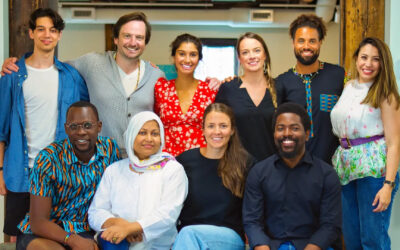In 2018, Gabrielle Masone launched Coloursmith with a mission of innovative lens development for modern eyewear. It was a solo venture at first, but quickly grew through pitch competitions, funding searches, and other organic means. A year later, and Coloursmith had a team of seven with their first commercial application under development.
While that all sounds like quick success, the truth is that things weren’t always so clear cut within the team. “It was a perfect storm of everybody having their first time doing a variety of things all at the same time,” says Masone, “Needless to say, there was a lot of awkwardness and conflict, and a loss of alignment.”
This had a hard impact on Masone, who felt like the business was slipping away from her. How could she get control of the reins again? Was it her? Was it her team? Fortunately, it was also around this time that she first heard of Imaginal Ventures.
“The Imaginal team came highly recommended when I was looking for business coaching,” Masone says, “And from our first meeting with them, they were asking all these big questions that made it really clear that I was not the only person feeling this way at this stage in starting a business. Things started to clear up instantly.”
Masone says that while she had been taught very technically how to run a company – how to manage the spreadsheets, how to have a quality business plan – she was missing the reasons why. This was the gap that Imaginal started to fill, helping her to understand why things are put together a certain way and what she was trying to communicate both to her team and to the world.
“If you don’t have the vision, you can’t know how to lead people to it,” she says, “We started seeing beyond just ‘hire this person and that person at this stage,’ and looking into the why behind every decision. Imaginal helped me to look at my business holistically, and to see how each choice makes sense in context.
Seeing Things Clearly
With the guidance of Imaginal Ventures, Masone was able to define and refine her vision for Coloursmith, understanding what she wanted both for herself and her business. One thing she learned is how important it is to focus on your own company instead of always comparing yourself to others.
“What I envisioned an early stage company to be was not at all what an early stage company actually is,” says Masone, “I was looking at other Canadian startups like Skip The Dishes, or at places like Uber, and I kept seeing all these people with these big titles and all these other things that look good on paper. At pitch competitions, you hear things like ‘we have a Director of X with a PhD in Y’ and it creates the impression that you build a business by getting big names with big degrees and letting them sort it out. And … no. That’s not how it should be at all. You need people with an aligned vision. Otherwise you start seeing the wrong decisions being made and you can’t stop it without micromanaging.”
She started to understand the many smaller phases that a growing company undergoes, and what needs to be done at each stage. This approach made it easier to decide who to hire, as you could see your needs in context. As she continued working with Imaginal, Masone gained an appreciation that she wasn’t alone in her struggles as an entrepreneur, and that indeed many founders go through very similar experiences.
“It was first-timer mistakes,” she says, “but those first-timer mistakes kill companies.”
Growing In Alignment
Under Imaginal’s guidance, Masone felt like all the pieces started to fall into place. She focused on understanding and accepting what needed to be achieved in the next six months, how to create and improve on processes, and how to find people who fit into that vision long term.
“Imaginal had the most amount of impact on me establishing the team and the vision, says Masone, “It’s hard to wade through all the advice you get as a founder. And it’s all correct, because it’s what helped someone else to succeed. But that doesn’t mean it will work for you. Imaginal taught me to ask what is going to impact the business the most today, and to focus on that.”
Now, in 2021, Coloursmith has a team of 14 people. Imaginal helped them put “guard rails” on how to get there, starting with envisioning a finished concept of team, functionality, and goals. They went through some churn to get there, but the people who didn’t fit with the vision left and took with them what didn’t fit. Now, they look for people who align with their values and culture first, then look at what they can do skillswise. “Everyone has something that perfectly classifies Coloursmith and I’m really proud of that,” says Masone, “We all have different reasons for helping the company, our roles are well defined, we all have a shared purpose.”
To get there, Masone credits the guided and templated work done with Imaginal Ventures. “The team at Imaginal Ventures is able to pull out information that you didn’t really know. It’s like a guided exercise to hit all these different things – what you’re doing, why, who it impacts, when, and so on. Before you know it, you have a fleshed out business plan that really comes from the heart, as opposed to the mosaic approach of looking at what other people do and seeing what applies to you,” Masone says, “It’s quite empowering. You actually believe in your goals, and champion them.”
Instead of the prescriptive advice so common in the entrepreneur ecosystem, which often leads to stress between “what you want and what something ‘should’ be,” Imaginal Ventures focuses on looking at what you want to do and how to trust yourself and your decision making.
“I was kind of falling out of love with how we were doing it. And Imaginal changed that.”




